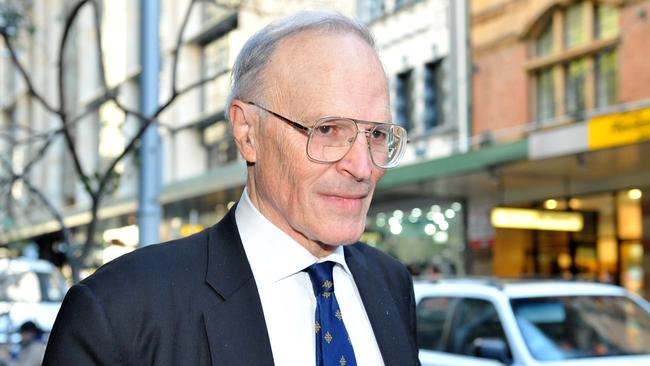Here’s why the unions want to silence Dyson Heydon
The trade union royal commission has referred 26 officials to law enforcement agencies and regulators.

The trade union royal commission has already referred 26 union and ex-union officials to law enforcement agencies and regulators to investigate more than 50 potential breaches of criminal and civil laws — and it is coming in under budget.
The royal commission, which The Australian can reveal had spent $28 million of its $61m budget by the end of June this year, is still investigating the Australian Workers Union over alleged donations and sweetheart deals with employers during the stewardship of Bill Shorten and his successors.
Further evidence this week tendered to the commission in Sydney builds on a raft of allegations since hearings began last year that unions are raising millions of dollars in untaxed funds from employers through so-called education and training and social welfare programs and income protection schemes. The revelations could result in further referrals for criminal and civil sanctions.
However, the work of the commission, which has already resulted in references to 11 commonwealth and state agencies — including alleged criminal charges against the construction union’s NSW head Brian Parker, Victorian secretary John Setka, and Queensland branch boss Michael Ravbar of the construction union — risks being undermined by attacks on its commissioner, Dyson Heydon. Labor ramped up its political assault on Tony Abbott yesterday by attacking on the floor of parliament the impartiality of the former High Court judge and claiming the trade union royal commission had been “politicised from the start”.
Deputy Liberal leader Julie Bishop hit back, accusing Labor MPs of smearing Mr Heydon in a desperate attempt to “protect themselves” and their “union masters” from the scrutiny of the royal commission.
Labor workplace relations spokesman Brendan O’Connor has alleged the inquiry will cost $80m. However, figures obtained by The Australian show the commission is likely to spend about half that amount. It’s understood that, in total, the Office of the Royal Commission, the police taskforces and Attorney-General’s Department costs, including Mr Heydon’s and all legal fees, had reached $28m by June 30. The figure does not include financial assistance to witnesses over the past year, or the cost of the Australian Federal Police involvement in the state-based taskforces.
The commission is unlikely to spend all of its budgeted $61m before Mr Heydon is scheduled to hand his final report to the government in December.
Arising out of the commission last week, the competition regulator said it would for the first time use its powers to combat pressure by unions of employers over the use of labour. Australian Competition & Consumer Commission chairman Rod Sims attributed the decision to evidence arising out of the royal commission’s Canberra hearings last month. During those proceedings, the commission’s police taskforce arrested construction union official John Lomax and ex-union official Fihi Kivalu on blackmail charges, and a concrete construction worker for perjury.
The arrests took the total by the commission to four after Queensland Construction Forestry Mining and Energy Union official Justin Steele was charged with assault in May.
Last week, Master Builders Australia backed the integrity of the evidence given to the commission so far. “The testimony of numerous witnesses including contractors, subcontractors, employees, employers and union whistleblowers, provides compelling evidence of a culture of intimidation, coercion and unlawful behaviours on and off building sites,” said chief executive Wilhelm Harnisch. “The integrity of the evidence provided by witnesses cannot be brought into question.”
Over 143 days of hearings the commission has heard hundreds of hours of evidence from union and industry figures, alleging threats, coercion, bullying, intimidation and harassment. It exposed an alleged “culture of bullying”, harassment and intimidation within the Victorian branch of the Health Services Union, which the commission heard was overseen by its branch secretary, Diana Asmar. Details of slush funds set up by the Australian Workers Union, the National Union of Workers, the Shop Distributive and Allied Employees Association, and the Canberra branch of the CFMEU have also been aired.
Mr Heydon’s interim report recommended sanctions against the construction union’s national office, the head of the health services union’s Victorian branch, the national office of the transport union and the Queensland office of the shoppies’ union. It examined the Victorian CFMEU branch black ban on concrete supplier Boral from construction sites as part of its “war” with developer Grocon in 2013. Mr Heydon warned the CFMEU “treats itself as above the law”.
The commission’s investigations into the CFMEU’s NSW branch exposed claims Mr Parker was involved in a plan to obtain confidential details of union superannuation members to use in his campaign against construction firm Lis-Con.
Its continuing investigations into Mr Shorten follow allegations he failed to disclose more than $40,000 donated to his political campaign by a company with which his union was dealing. The AWU has also come under fire over revelations it traded away the penalty rates of low-paid workers, and received hundreds of thousands of dollars in unexplained payments.






